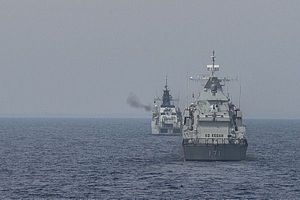Last week, the defense ministers of Indonesia, Malaysia, and the Philippines met for another round of discussions tied to the advancement of a new trilateral cooperation mechanism for managing a range of security challenges in the Sulu Sea. The meeting put the spotlight on the ongoing efforts by the three countries to build out the mechanism in spite of the obstacles that remain in doing so.
As I have noted before in these pages, trilateral patrols in the Sulu Sea, which had been discussed as early as 2016, finally began to take shape as the Trilateral Cooperative Agreement (TCA) in 2017, with maritime patrols launched in June after multiple delays, air patrols taking off subsequently in October, and the gradual integration of Singapore and Brunei as observer countries as well. The patrols have become one of several mechanisms through which Southeast Asian states are aiming to tackle a whole range of transnational threats, including terrorism (See: “ASEAN Terrorism Threat in Focus at 2018 Shangri-La Dialogue”).
Since then and onto 2018, we have heard some further specifics as well, such as hubs for operation in each country and rotations for patrols. But while there have been some indications of progress and reductions in security incidents, it is still early days and there are lingering challenges and delays on some fronts as well.
Last week, the trilateral mechanism was in the headlines again as the three defense ministers – Delfin Lorenzana of the Philippines, Ryamizard Ryacudu of Indonesia, and Mohamad Sabu of Malaysia (the newcomer in the group, having just assumed his position as part of a new government in Malaysia following elections in May) – met in Manila. The meeting was part of a series that had been agreed to be held at the working level as the three countries look to build out aspects of trilateral cooperation.
During the meeting, the ministers touched on several aspects of transnational challenges and state responses. Unsurprisingly, they reinforced some key points they have all made individually before with respect to addressing challenges tied to the Islamic State and other terrorist groups, such as the importance of a comprehensive approach to counterterrorism rather than one that is overly military-focused, and the need for greater integration due to the borderless nature of many of the issues being faced (See: “ASEAN’s Post-Marawi Islamic State Challenge”).
There was also discussion about follow up steps in strengthening trilateral cooperation as well. According to the Indonesian defense ministry’s account of the meeting, Ryacudu once again noted the importance of building out the land patrol training component of collaboration as an area of focus. This is in addition to existing cooperation that is occurring at lower levels, including enhanced coordination between assigned maritime command centers and the information sharing between the three sides.
To be sure, it is still early days with respect to the new trilateral cooperation mechanism, and more details are likely to be unveiled in subsequent meetings, including the next one, which was scheduled to be held in Malaysia. There are also real challenges that affect how quickly collaboration can actually take shape independent of what the ministers may desire. Nonetheless, the holding of the meeting was nonetheless yet another testament to the significance that the three countries attach to such cooperation despite the obstacles that remain.
































